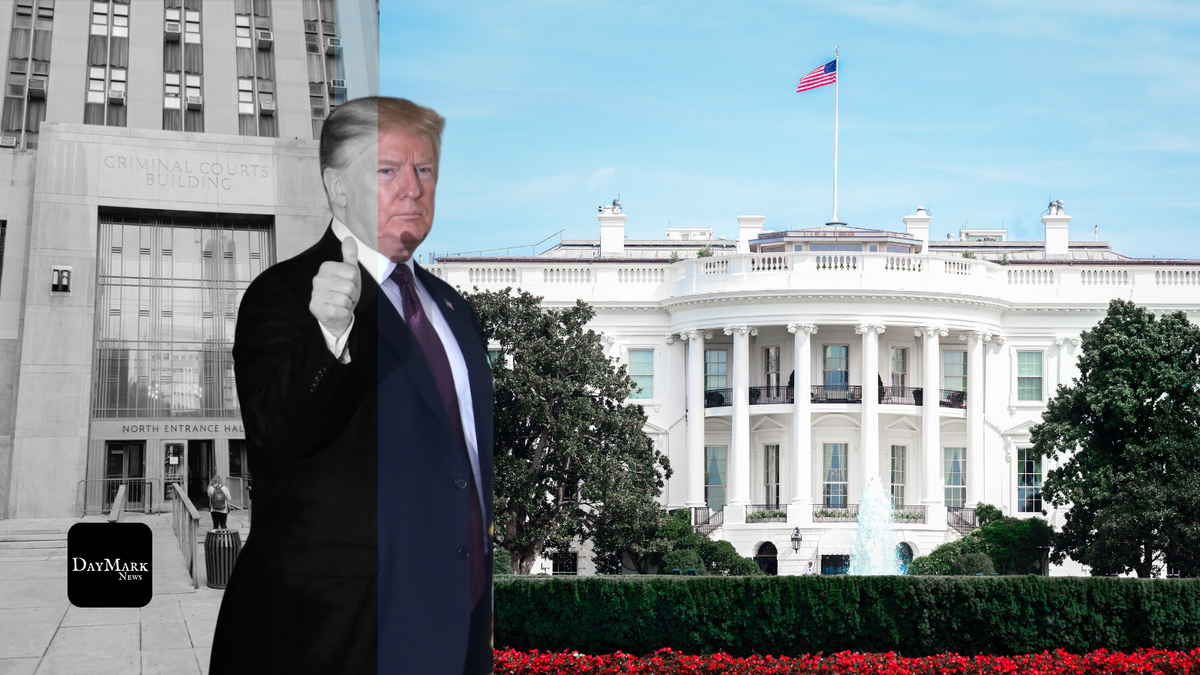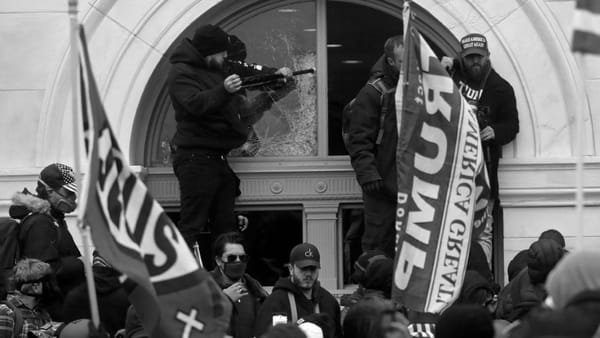Trump’s Felony Status: Is It Time to Free Felons’ Rights?
Donald J. Trump’s second inauguration is set to be an ironic spectacle—a convicted felon swearing to uphold the Constitution while millions of Americans with lesser convictions are barred from voting. This paradox lays bare America’s hypocritical justice system: a man who falsified records to pay

By I.V. Hill | DayMark News
Donald J. Trump’s second inauguration on January 20 is set to be a grand affair—red hats, gold-plated everything, and the undeniable stench of irony wafting through the National Mall. This time, though, the man sworn to “preserve, protect, and defend” the Constitution will be doing so as a convicted felon. Yes, America, the same guy who scribbled hush money checks to keep his affairs off Page Six is now poised to retake the Oval Office.
Cue the national soul-searching: If Trump can sit in the big chair with a criminal record, why can’t four million other felons even vote?
Rules Don’t Apply When You’re King
Trump’s New York conviction for falsifying business records to hide a $130,000 payout to Stormy Daniels has been spun into political gold. For his MAGA faithful, it’s proof their guy is just misunderstood—like Robin Hood, if Robin Hood had traded Sherwood Forest for Mar-a-Lago and robbed the government instead of the rich.
Meanwhile, felons across America are stuck on the sidelines, locked out of basic rights. In states like Tennessee and Mississippi, regaining the right to vote often feels like solving a riddle from The Da Vinci Code. In Florida, where Trump spends his days golfing and dodging subpoenas, felons technically regained voting rights—until lawmakers tacked on a "pay-to-vote" clause, demanding all fines and fees be paid first. The process can seem as convoluted as applying for a bank loan, with rules that are strict—unless, of course, you’re the one writing them.

The hypocrisy is so thick you could spread it on toast. Trump, a man who turned his legal woes into a rallying cry, will take an oath to lead a country that denies millions of former inmates the right to vote. “If he can run the country, why can’t I cast a ballot?” is not just a fair question—it’s the only question.
Felons for Thee, Not for Me
The numbers don’t lie. The Sentencing Project reports that 4 million Americans were barred from voting in 2024 due to felony convictions. And let’s not pretend this is an equal-opportunity punishment. Black Americans are disenfranchised at triple the rate of white Americans. In some states, more than 10% of Black men can’t vote. Trump, on the other hand, can become the leader of the free world after doing his best impression of a mob accountant.
“Denying voting rights to felons after they’ve served their time isn’t justice—it’s petty retribution,” said Danielle Root, a voting rights advocate. Yet, the laws remain. A person convicted of tax fraud can’t vote for a dogcatcher, but they can oversee the IRS if they manage to claw their way to Pennsylvania Avenue. Go figure.
The Felony Franchise
Trump’s criminal conviction has accidentally opened Pandora’s ballot box. If the presidency can be occupied by a felon, how can we continue to deny felons the right to serve on juries or, heaven forbid, vote? The absurdity is almost poetic: Trump couldn’t sit on a jury deciding his own guilt, but he can appoint federal judges from the West Wing. This is the American justice system in all its contradictory glory.
Historically, felony disenfranchisement laws have been less about justice and more about control. During Reconstruction, Southern states weaponized these laws to keep newly freed Black men out of politics. Today, the legacy endures. Laws once aimed at loiterers and petty thieves are now dressed up as “public safety” measures, designed to make life miserable for anyone with a criminal record.
Trump, the Redemption President?
Despite the insanity of this situation, there’s a growing chorus of voices calling for change. A 2024 Pew Research poll found that 69% of Americans think felons should regain their voting rights after completing their sentences. Even among Republicans, support is creeping upward at 60%—possibly spurred by Trump’s knack for making felonies look downright patriotic.
Yet don’t hold your breath for Trump to become a champion for prison reform. His entire brand is built on being the exception, the rule-breaker who thrives where others falter. “They’re not coming after me—they’re coming after you,” he says, conveniently ignoring that “you” will not be inaugurated any time soon.
And let’s be real: Trump’s version of redemption has less to do with social justice and more to do with ratings. He’s turned his conviction into a badge of honor, fundraising off his felon status like it’s a new Trump-branded cologne. (Eau de Subpoena, perhaps?)
The American Absurdity
Here’s the kicker: If Trump were in Florida, his own state, he likely wouldn’t even be able to vote for himself. That’s the justice system for you—equal parts comedy and tragedy. A felon can lead the nation but not participate in its democracy.
As January 20 approaches, the question looms: Will Trump’s presidency force America to confront its hypocritical approach to justice? Or will it just be another four years of political theater, starring a man who can’t decide whether to rule the country or sue it?
Either way, the real losers are the millions of felons left out of the conversation. If redemption is good enough for a man with his name on a tower, it should be good enough for everyone else.
This article is licensed under Creative Commons (CC BY-NC-ND 4.0), and you are free to share and republish under the terms of the license.
At DayMark News, we are committed to exposing the rise of authoritarianism and its threat to democracy. In a time when disinformation spreads like wildfire and democratic institutions face relentless attacks, we need your support to keep the fight alive.
Investigative journalism is our weapon against authoritarian ideologies. We delve deep to uncover the truths others would rather keep hidden, while providing actionable resources to empower individuals like you to defend our democracy.
We believe in transparency, integrity, and the power of a well-informed public. But maintaining a platform dedicated to fearless reporting and mobilization requires resources. We refuse to bow to corporate interests or compromise our mission. That's why we turn to you — our community.
Every donation, big or small, helps us continue our work. With your support, we can produce the in-depth analyses, breaking news, and educational tools needed to resist the rise of extremist movements and protect democratic values for future generations.
This fight belongs to all of us. Together, we can ensure that democracy not only survives but thrives. Please consider making a contribution today to keep DayMark News strong and independent.
Donate Now: Because Democracy Can't Defend Itself.

 Donate
Donate



